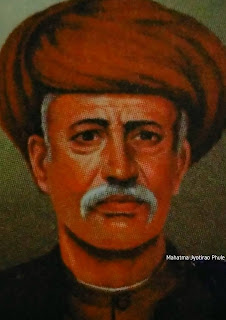Mahatma Jyotirao Govindrao Phule
The Great Thinker and Social Reformer
Mahatma Jyotirao Govindrao Phule was born on 11
April 1827. His native village was Katgun in Khatav taluka of Satara district. Mahatma
Jyotirao Phule was a great thinker. He did a great revolutionary work of social
transformation. He was a great writer. He wrote for the transformation of
society from the point of view of agriculture and the peasantry. He also had a
good study of theology.
 |
| Mahatma Jyotirao Phule |
Mahatma Phule and his wife Savitribai laid the foundation of women's education in India with a progressive ideology. He worked tirelessly for education, agriculture, caste system, upliftment of women and widows. There was discrimination between high and low. He worked to bridge the gap between all these types.
Efforts were made for women's education, education of boys and girls of backward castes and religions and education of boys and girls of all castes and religions. He first educated his wife. Then in the month of August 1848, the first school for girls was started in Pune.
In September 1873, Mahatma Phule founded the Satyashodhak Samaj. When he saw that society was being exploited in a selfish way, he tried to prevent it. When he saw the plight of Bahujan Samaj, Shudras and Dalits, he started protesting. His emphasis was on equal rights for all and social tolerance. From that, he worked to bring the backward society forward. He did a great job in helping small poor farmers to progress. That is why Dhananjay Raveer has mentioned him as the pioneer and elder leader of the Indian social revolution.
Early life of Mahatma Phule
He was born in a flower gardener family in Satara district. His father Govindrao used to trade in vegetables. His grandfather had settled in Pune.
During the last Peshwa period, Mahatma Phule's father and two cousins were engaged in supplying flowers, hence the name Phule. When Mahatma Jyotirao Phule was only nine months old, his mother passed away. After completing his primary education, he started helping his father in farming.
They were married at the
age of 12. Some Muslim and Christian families lived next door. He knew that
Mahatma Phule's intelligence was immense. He suggested to Mahatma Phule's
father that his further education should be. Accordingly he completed further education in 1847 at the Scottish
Mission High School.
He read a book on human rights written by Thomas Payne in 1791. It affected their minds. He began to think about social justice. That is why she decided to focus on women's education and backward caste education to eliminate inequality. He was of the firm opinion that social discrimination would be reduced.
Satyashodhak Samaj
The Satyashodhak Samaj was founded on September 4, 1873 by Mahatma Jyotirao
Phule. He was the first president and
treasurer of Satyashodhak Samaj Society.
The main objective of the Satyashodhak Samaj was to stop the
exploitation of the Shudras and Atishudras by the upper caste Brahmins. He
started doing this by reading the Vedas. He began to oppose racial
discrimination and four-color discrimination.
When Mahatma Phule founded Satyashodhak Samaj, Savitribai Phule headed the women's
section. Along with Savitribai,19 women started the work of Satyashodhak Samaj.
At the same time, she was working as a teacher in a girls' school. Deenbandhu
Prakashan published articles during the Satyashodhak movement.
After the death of Mahatma Phule in 1890 at the age of 63, his thoughts, conduct and teachings were picked up by the Satyashodhak Samaj and the Satyashodhak movement gained momentum in a real sense.
They Spread awareness that No religion is created by God and the creation of ingenuity and caste is man-made That is why they come before us. The movement reached the grassroots of Maharashtra. Chhatrapati Shahu Maharaj supported the Satyashodhak movement .
You may like these post also








0 Comments